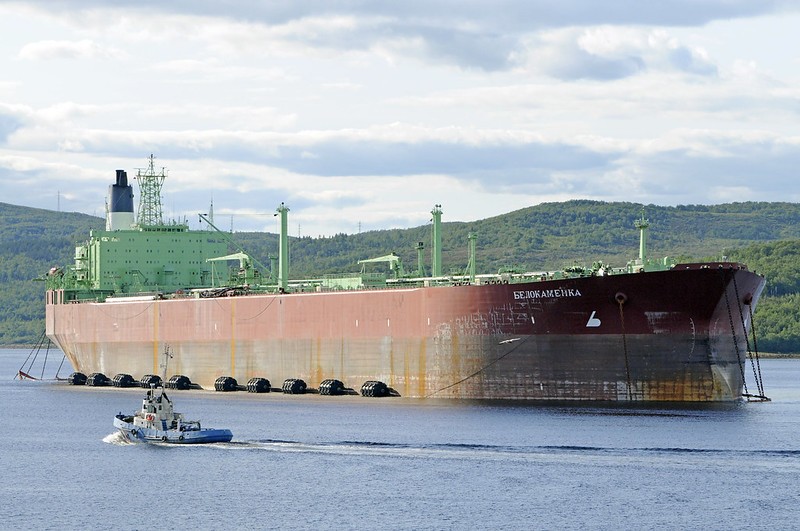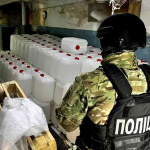With the West’s efforts to aid Ukraine by subverting Russia’s oil and gas industry, Moscow has placed more emphasis on what is known as ‘deceptive shipping practices’ (DSPs) in order to keep its economy afloat and its war chests filled.
“Russia has been steadily conducting business despite sanctions since the invasion of Ukraine,” Windward Ltd., an Israeli consultancy firm that specializes in maritime risk management, told OCCRP. “As a large part of Russia’s economy is oil-based, maintaining the shipments of oil is paramount for the Russian economy.”
In late 2022, the U.S. spearheaded a coalition, comprised of the G7 states, the EU, and Australia, to impose a price cap on imports of Russian crude that would not exceed US$60 a barrel. These countries similarly forbade their respective shipping companies, which amount to a large portion of the world’s tanker fleet, from facilitating any trade with Russia above that price.
On Feb. 21, 2022, just a few days before the invasion, Russian crude was priced at a little over $91 per barrel. This 33 percent knee-capping therefore necessitated the Kremlin to resort to more under the radar practices to keep its maritime oil sector afloat.
Enter the Shadow Fleet, hundreds of tanker vessels sailing the open seas, employing DSPs to hide their movements or conceal their identities.
Amongst the classic methods is the disabling of a ship’s onboard Automatic Identification System (AIS) to manipulate its location tracking data and mask its movements.
“Vessels also utilize ship-to-ship (STS) transfers wherein a vessel will meet up with another at sea and transfer its cargo or oil to conceal the origin,” Windward told OCCRP. “The more meetings a vessel has, the harder it is to detect the origin of the oil.”
Not only do DSPs allow Russia to pursue multiple avenues to offload its oil, but it helps buyers obfuscate their own records and circumvent sanctions.
“These ship-to-ship transfers allow for a ship to leave one place with a cargo and that cargo to arrive at the next port of call on a different ship that perhaps doesn't have the same sets of concerns tied to its identity,” Ian Ralby, Founder and CEO of I.R. Consilium, an American firm that specializes in maritime law and security, told OCCRP.
Other known practices include sailing close enough to a clean ship in order to piggyback on its AIS, or by assuming a scrapped vessel’s identity to conduct illicit operations, what Windward calls a ‘zombie vessel’.
The Israeli maritime intelligence firm noted a 68 percent increase in the monthly average of Russian barrels per day (BPD) shipped by the Shadow Fleet in the first year following the invasion. For crude oil alone, trade by the fleet spiked from about 813,000 bpd in Feb. 2022 to more than 1.3 million bpd 12 months later.
Likewise, a report indicated that from 2022 to 2023 the monthly average of ships engaging in deceptive practices after a port call in Russia increased by 216%.
Vortexa, a maritime trade analysis firm, estimates that Russia has clandestinely transported some 2.6 million bpd post-invasion.
“If you look at the impact of the sanctions on Russia, part of the hope was that they would curtail Russian involvement in financial communities and economic marketplaces to the extent that Russia had to change its behavior,” Ralby told OCCRP.
“After two plus years…the war rages on and does not show any signs of either stopping or weakening. And at the same time, Russia's economy has not collapsed or even downsized to the extent that many had hoped, largely because of this opportunity to trade with these third market enablers.”
It’s not only sanction evaders who are buying up Russia’s oil; certain countries not bound by the Coalition’s price cap or the West’s sanctions have instead seized the opportunity to strengthen trade relations with Moscow and gain access to more of its immense oil and natural gas reserves at a discount.
Turkey, for instance, upped its Russian oil imports by 150 percent from 2021 to 2023. In that same timeframe, China has bought an average of 700k more bpd from Russia, from 1.6 million to 2.3 million. And India, the biggest opportunist, bought 1,900 percent more in 2023 than in 2021, from 100k bpd to 1.9 million bpd.
All in all, Russia has succeeded in avoiding significant damage to its energy sector, with Windward noting that, in April 2024, Russia managed to double its year-over-year oil and gas revenue to $14 billion.
And in spite of the West’s sanctions as a whole, Russia reported a 3.6 percent growth in its GDP in 2023, following a 1.2 percent contraction the year prior.



